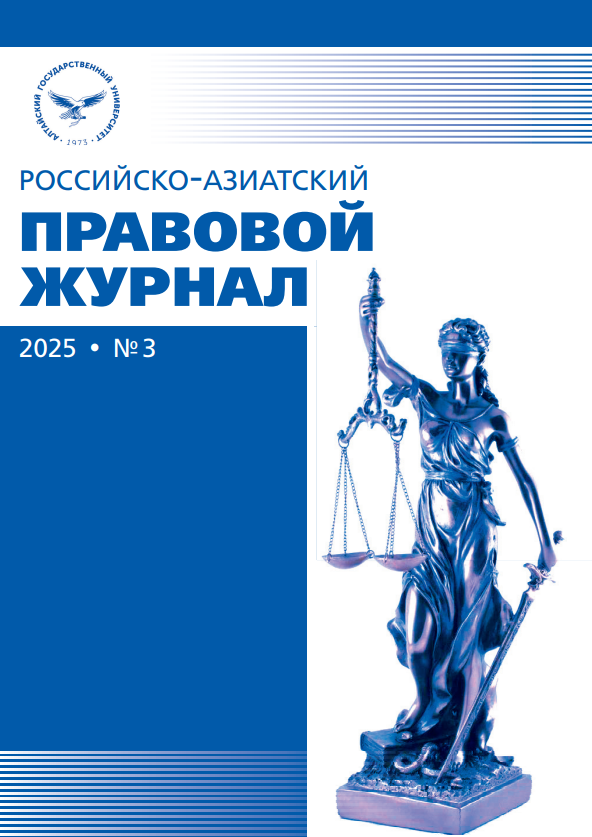ON A NEW SUBJECT INCIVIL LAW
УДК 347.1 ББК 67.404.01
Abstract
Within the framework of this article, it seems appropriate to analyze the currently existing approachesto the legal capacity of AI, models of legal capacity of AI, assess the risks and indicate potential ways ofdeveloping domestic legislation. The author concludes that today in the Russian Federation AI is qualified atthe legislative level exclusively from the position of alaw object — a set of technological solutions, technologies,means, which does not prevent the scientific community from proposing other approaches and models for theprospect of the emergence of the so-called strong AI. At the same time, it seems that the consideration of AI asa law subject is a deferred action in time, and with the increase in its autonomy, the question of redistribution,for example, tort liability will arise, including one can expect a preferential assignment of certain types ofproperty to AI compared to the traditional one.
Downloads
References
2. Блинова Ю.В. НИТ и преподавание иностранных языков // Педагогический университетский вестник Алтая. 2002. №2. С. 348–353.
3. Bryson J.J., Diamantis M.E., Grant T.D. Of, for, and by the People: The Legal Lacuna of Synthetic Persons // Artificial Intelligence and Law. 2017. Vol. 25. P. 273–291.
4. Левин Д.Б. Актуальные проблемы теории международного права. М. : Наука, 1974. 264 с.
5. Ладенков Н.Е. Модели наделения искусственного интеллекта правосубъектностью // Вестник Балтийского федерального университета им. И. Канта. Сер.: Гуманитарные и общественные науки. 2021. №3. С. 12–20.
6. Пономарева Е.В. Субъекты и квазисубъекты права: теоретико-правовые проблемы разграничения : дис. … канд. юрид. наук. Екатеринбург, 2019. 208 с.
7. Васильев А.А., Печатнова Ю.В. Место искусственного интеллекта среди элементов состава правоотношения // Цифровое право. 2020. Т. 1. №4. С. 74–83.
8. Абрамова Е.Н., Старикова Е.В. Искусственный интеллект как субъект авторского права // Гипотеза. 2020. №1 (10). С. 32–38.
9. Talimonchik V.P. The Prospects for the Recognition of the International Legal Personality of Artificial Intelligence // Laws. 2021. №10. P. 85–95.
10. Антонова Е.Ю. Технологии искусственного интеллекта — субъект преступления или орудие / средство совершения преступления? // Юридический вестник Кубанского государственного университета. 2022. №1 (14). С. 31–39.
11. Шестак А.В., Волеводз А.Г., Ализаде В.А. О возможности доктринального восприятия системой общего права искусственного интеллекта как субъекта преступления: на примере уголовногозаконодательства США // Всероссийский криминологический журнал. 2019. Т. 13. №4. С. 547–554.
12. Никитенко С.В. Концепции правосубъектности искусственного интеллекта // Научные междисциплинарные исследования. 2020. №2–2. С. 39–51.
13. Медведев Д.А. Искусственный интеллект как субъект права: деликтоспособность искусственного интеллекта // Вестник Российского нового университета. Серия: Человек и общество. 2023. Вып.4. С. 146–151.
14. Данилов И.Б. Концепции правосубъектности систем искусственного интеллекта // Интерэкспо Гео-Сибирь. 2022. Т. 5. С. 23–26.
15. Филипова И.А., Коротеев В.Д. Будущее искусственного интеллекта: объект или субъект права? // JournalofDigitalTechnologiesandLaw. 2023. Vol. 1. №2. P. 359–386.
16. Морхат П.М. Правосубъектность искусственного интеллекта в сфере права интеллектуальной собственности: гражданско-правовые проблемы : дис. … докт. юрид. наук. М., 2018. 420с.
17. Darling K. Extending Legal Protection to Social Robots: The Effects of Anthropomorphism, Empathy,and Violent Behavior towards Robotic Objects // Calo R., Froomkin M. A., Kerr I. (eds.) Robot Law. Cheltenham, Northampton: Edward Elgar Publ., 2016. P. 213–231.
18. Maatz J. Deanthropozentrierte Rechtssubjektivität // Zeitschrift für geistiges Eigentum. 2024. Jh. 16. H. 4. S. 425–448.
19. Блинова Ю.В. Правосубъектность искусственного интеллекта: международно-частная перспектива // Марийский юридический вестник. 2023. №1–2 (41). С. 29–32.
Copyright (c) 2025 Ю. В. Блинова

This work is licensed under a Creative Commons Attribution 4.0 International License.
Russian-Asian Law Journal is a golden publisher, as we allow self-archiving, but most importantly we are fully transparent about your rights.
Authors may present and discuss their findings ahead of publication: at scientific conferences, on preprint servers, in public databases, and in blogs, wikis, tweets, and other informal communication channels.
Russian-Asian Law Journal allows authors to deposit manuscripts (currently under review or those for intended submission) in non-commercial, pre-print servers such as ArXiv.
Authors who publish with this journal agree to the following terms:
- Authors retain copyright and grant the journal right of first publication with the work simultaneously licensed under a Creative Commons Attribution License that allows others to share the work with an acknowledgement of the work's authorship and initial publication in this journal.
- Authors are able to enter into separate, additional contractual arrangements for the non-exclusive distribution of the journal's published version of the work (e.g., post it to an institutional repository or publish it in a book), with an acknowledgement of its initial publication in this journal.
- Authors are permitted and encouraged to post their work online (e.g., in institutional repositories or on their website) prior to and during the submission process, as it can lead to productive exchanges, as well as earlier and greater citation of published work (See The Effect of Open Access).








